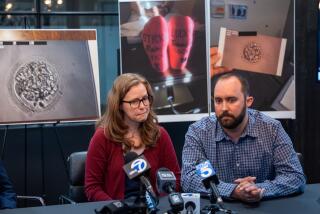UCLA outbreak: Family of 48-year-old who died sues scope maker

- Share via
Following a superbug outbreak at UCLA, the family of a 48-year-old patient who died there has sued a medical device maker for wrongful death.
The family of Antonia Torres Cerda sued Olympus Corp. of the Americas on Wednesday in Los Angeles County Superior Court.
Cerda, who lived in Corcoran in California’s Central Valley, was exposed to a contaminated Olympus duodenoscope at UCLA’s Ronald Reagan Medical Center in October and as a result she “suffered significant injury and died,” according to the suit.
In addition to wrongful death, the family’s complaint accuses the company of negligence and fraud in selling and promoting a “defective” scope. The family’s attorney said Cerda died Nov. 8.
Another patient, Aaron Young, sued Olympus on Monday for negligence in connection with his superbug infection from a tainted scope. The 18-year-old high-school student is still hospitalized at UCLA, according to attorney Pete Kaufman, who represents both families.
Kaufman said the families of both patients declined to comment. Cerda’s suit listed her as having a spouse and four children in Kings County as well as one parent in Mexico.
UCLA and the University of California regents may be added as defendants in these cases as more details emerge, Kaufman said.
The university has said seven patients were infected with the CRE superbug from scopes made by Olympus, a unit of the Japanese electronics giant.
The infections contributed to the deaths of two of those patients, the university said, and 179 other patients may have been exposed from Oct. 3 to Jan. 28.
CRE, which stands for carbapenem-resistant Enterobacteriaceae, is highly resistant to antibiotics and can kill up to 50% of infected patients.
UCLA has declined to comment on whether Cerda and Young were part of the CRE outbreak, citing patient confidentiality.
A spokesman for Olympus couldn’t be reached for comment about the latest lawsuit.
Last week, the company said it was monitoring the issue of patient infections and had given medical providers additional instructional materials on cleaning the scopes.
“The Olympus TJF-Q180V requires careful attention to cleaning and reprocessing steps, including meticulous manual cleaning,” the company said last week.
The Cerda family’s lawsuit contends that Olympus redesigned its Q180V duodenoscope last year and failed to provide an “effective and validated reprocessing protocol” for the new version.
Despite the change, the company gave hospitals and doctors cleaning instructions for an older model, which meant that users were not able to effectively sanitize the new Q180V scope, according to the suit.
Last week, the Food and Drug Administration warned medical providers that following manufacturers’ cleaning instructions does not ensure that these commonly used scopes are free of bacteria.
The agency said bacteria can become trapped in tiny crevices near the tip of the scope where a camera and other attachments are found.
After the outbreak, UCLA said that it switched to a gas sterilization method and that no new infections from the devices have occurred.
Nationally, about half a million patients a year are treated with the scopes in a procedure known as endoscopic retrograde cholangiopancreatography, or ERCP.
Let us know if you have been affected by the outbreak at UCLA
Twitter: @chadterhune
More to Read
Inside the business of entertainment
The Wide Shot brings you news, analysis and insights on everything from streaming wars to production — and what it all means for the future.
You may occasionally receive promotional content from the Los Angeles Times.











